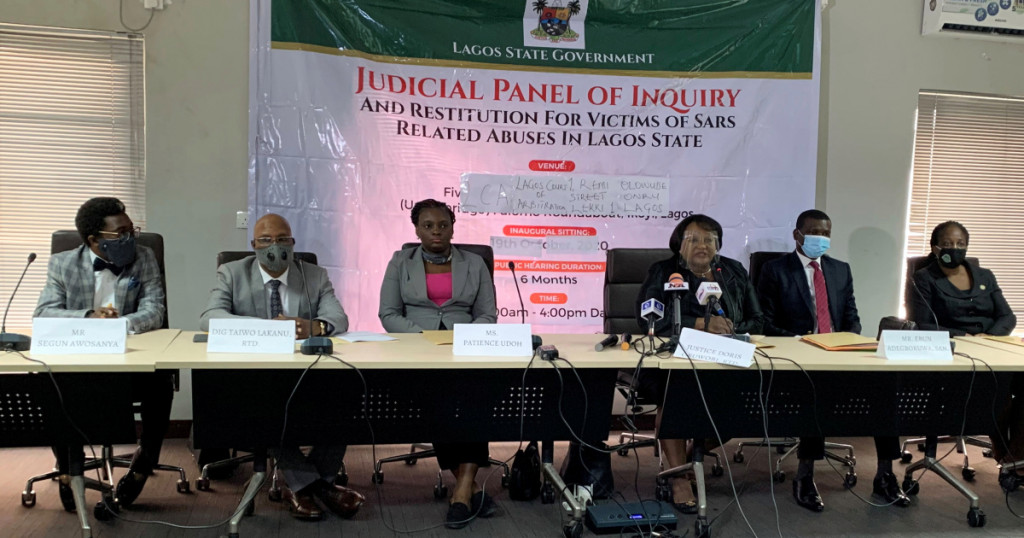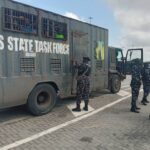Apart from the non-compliance by security personnel to honour summons, many complainants also refused to appear before the judicial panels of inquiry of the #EndSARS set up in the wake of the protests against Police brutality.
This is contained in a report titled “CSO Observatory on Police Reform Decries Non-Compliance of Security Officials to Summons Issued by the Judicial Panels of Inquiry” and jointly signed by the Executive Director, CLEEN Foundation, Dr. Benson Olugbuo, and National Coordinator, Network on Police Reform in Nigeria (NOPRIN) Foundation, Emmanuel Ikule on Friday in Abuja.
The report said that paucity of funds, lack of interest and possible threat from security agents among other were responsible for the development.
According to the report, the attitudes of many of the indicted the security personnel and some complainants undermined the proceedings and other activities of the panels.
According to the report, the various Judicial panels of Inquiry constituted by 29 state governments of Abia, Adamawa, Akwa Ibom, Anambra, Bauchi, Bayelsa, Benue, Cross River, Delta, Ebonyi, Edo, Ekiti, Enugu, Gombe, Imo, Kaduna, Katsina, Kogi, Kwara, Lagos, Nasarawa, Niger, Ogun, Ondo, Oyo, Osun, Plateau, Rivers, Taraba states respectively and the Independent Investigative Panel of Inquiry set up by the National Human Rights Commission, Federal Capital Territory, Abuja commenced sittings from 15 October 2020.

Non-compliance by security personnel on summons
The report stated that members of the CSO Observatory reported a high rate of non-compliance to panels rulings and evasion of service process by security operatives across most states of the federation.
“For instance, in Lagos State, the Military refused to enter appearance at the panel proceedings despite rulings to that effect. Similarly, in Akwa-Ibom State, petitions before the panel have suffered adjournments due to the manner in which police officers evade summons. This made the Legal Unit of the Akwa-Ibom State Police Command seek for more time to enable them to locate their officers thereby delaying petitions,” the report said.
It added that in Bayelsa State, police officers who have been petitioned by the public have either retired from the Nigeria Police Force or have been transferred to other State Commands hence delaying the panel sittings.
It said, “Furthermore, the CSO Observatory reported that military personnel in the state petitioned to the panel refused to appear and did not send legal representations. In Edo State, the Chairperson of the Panel of Inquiry complained of the unwillingness of security agents (police/army) to appear before the panel which has caused undue delay.
“In addition, in Imo state, the refusal of police officers to appear before the panel is gradually stalling proceedings of the panel.”
Complainants too shunning the panels
The report added that in some states, complainants have refused to appear before the panel and pursue their cases to a logical conclusion even with legal representation.
According to the report, for instance, in Benue state,50 percent of complainants have failed to testify before the Panel of Inquiry and that unfortunately, the complaints are not traceable either by address or their phone contacts.
It said that similarly, in Oyo and Delta states, there is to be apathy by some complainants due to paucity of funds, lack of interest and possible threat from security agents.

Petitions received by panels
The report said that in January 2021, 298 petitions were received by 13 panels of Abia, Akwa-Ibom, Bauchi, Bayelsa, Benue, Delta, Edo, Gombe, Imo, Ondo, Plateau, Lagos and Taraba states.
The report observed that while Lagos State had the highest number of petitions numbering 120, Akwa-ibom had the lowest with just two petitions filed.
It said that this is minimal when compared to 2,746 petitions it received in December 2020.
“Cumulatively, a total of 3,044 petitions have been filed across the 29 states and the FCT as at January 31st, 2021. The geographical distribution of the petitions indicates that the South-South leads with 763 petitions, South-East 737 petitions, South-West 713 petitions, North-Central 457 petitions. The North-West follows with 295 petitions and the North-East has 79 petitions,” it said.
Concluded cases
The report said that as at 31 January 202; 290 cases were concluded across the country which is low compared to December 2020 which reported 349 concluded cases.
It said that cumulatively, as at 31 January 2021; 639 cases have been concluded out of 3,044 filed petitions.
“This is poor for panels that have spent 50 percent of their lifetime (6 months). It is imperative to note that justice delayed is justice denied and this is capable of leading to lack of trust and confidence in the work of the panels across the states.
“For example, In Delta State, it was observed that sitting is only two days in a week while some panels sit only at their convenience. Furthermore, some proceedings commence late on the days of sittings due to late arrival of panel members,” the report said.
Other challenges
Apart from the attitudes of the security agents and complainants that undermined the works of the panels, the report also listed cases being abandoned and struck out.
This was such that 82 cases were struck out in January 2021 by the various state judicial panels over issues bordering on lack of jurisdiction, abandonment of cases by complainants and lack of diligent prosecution
It equally listed the timeframe to conclude hearings.
The report also noted that seven states of Borno, Jigawa, Kano, Kebbi, Sokoto, Yobe and Zamfara were yet to constitute the panels.

Gaps identified
The report pointed out that there was gross display of gender insensitivity through marginalization of women in the constitution of the panels across the 29 states and FCT with the exception of Plateau State that has more female than male members and Lagos State that has equal male and female members.
“Cross River State has a seven-member all-male panel. Enugu, Bayelsa and Benue states have only one female member each. This is grossly inadequate. A total of 333 persons were appointed to serve into respective Judicial Panels made up of 262 males and 71 females.
“This issue of underrepresentation of women in the panels should be revisited by the State Governments to ensure fairness and equity in the appointment of panel members,” it said.
It also listed high level of adjournment of cases by the panels which may hamper the process and subsequently defeat the interests of justice for the families of victims and survivors of police brutality in Nigeria.
Way forward
The report therefore recommended that state government should ensure gender balance in the appointment of panel members across Nigeria.
“Security personnel with petitions levelled against them should be subpoenaed to appear before the panel and adequately respond to issues as it relates to them; state governments should adequately fund the Judicial Panels of inquiry to enable the panels achieve maximal results; government should extend the timeframe set aside for the Judicial Panels to conclude hearing of cases due to the high number of cases received.
“The Nigerian Bar Association (NBA) should intensify efforts in sensitizing the public about the ongoing free legal representations and make accessibility easier for petitioners by stationing representatives daily at the sitting venue of the panel to attend to pro-bono matters.
“The Judicial Panels of Inquiry need to offer protection mechanisms to complainants and victims of police brutality as most complainants are scared of continuing their cases due to threat by security personnel petitioned before the panels,” it said.
It also urged the Victims Support Fund (VSF) to extend their services to the activities of the panels in relation to the needs and welfare of families of victims and survivors.

 Join Daily Trust WhatsApp Community For Quick Access To News and Happenings Around You.
Join Daily Trust WhatsApp Community For Quick Access To News and Happenings Around You.

